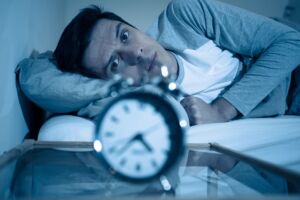For a wide variety of reasons, the general public knows more about post-traumatic stress disorder (PTSD) these days. With about five percent of Americans being diagnosed with PTSD in their lifetimes, this awareness is a good thing. However, there’s still plenty to learn about this complex condition. For example, there is an inherent connection between PTSD and sleep.
Many mental health issues can cause sleep disturbances. However, such sleep problems are literally part of a PTSD diagnosis. Sure, nightmares are often associated with trauma, but more research is being done to assess the sleep-PTSD link. In fact, it’s still not been determined if sleep is a cause or effect.
Nightmares and Insomnia Are Connected
A nightmare is like a nocturnal, intrusive thought. Your mind replays the traumatic event, and this causes the person to be triggered over and over. The aftermath of such nightmares can lead to insomnia and from there, plenty more problems can surface.
During the day, it’s generally easier to distract oneself from traumatic memories. This feels like a welcome respite, but the cost comes due as the sun goes down. Stress builds up all day from not processing trauma, and this contributes to disrupted sleep in the evening.
Why Does PTSD Cause Nightmares and Then Create Insomnia?
-

Lack of Sleep: PTSD causes a general sense of restlessness. In addition, a trauma survivor may unconsciously avoid sleep, fearing nightmares and flashbacks. These factors combine to unleash a pattern of being tired all day and fearful all night. The ensuing loss of sleep only increases anxiety and the probability of intrusive thoughts.
- Sleep-Talking: Someone who has experienced traumatic events is more likely to talk in their sleep. This leads them to wake up several times per night. Also, if they have a partner, that person may wake them to get them to stop talking.
- Anti-Silence: Trauma survivors often find silence to be disconcerting. The nighttime — with its quieter vibe and its darkness — feels triggering. It can reach a point where they leave a TV or other sound source on all night to break the silence. This backfires when the background noise impacts their ability to fall asleep.
- High Alert: If you have PTSD, you allocate a lot of energy toward keeping your guard up. Your mind and body can’t relax as you perceive danger all around you. In this mindset, sleep can feel risky and you’re very easily awakened by noises and sounds. Once again, you lose restful sleep and this feeds the trauma cycle.
- Self-Medication: In a desperate attempt to silence the intrusive thoughts and get some decent sleep, people with PTSD may turn to drugs and/or alcohol to help them fall asleep. Initially, this approach may appear like it’s working. Eventually, though, substance abuse directly causes sleep disturbances and a new cycle commences.
What Steps Can Be Taken by PTSD Sufferers?
Working with a trauma-informed therapist is a valuable choice when seeking ways to cope with PTSD. At the same time, there are self-help steps that can complement your treatment.
- Accept that sleep problems are not uncommon with PTSD, but they can be addressed.
- Start by setting an alarm to wake up at the same time each day; this can make it much easier to stick to a steady bedtime.
- Create a sleep-friendly routine in the evening.
- Turn off devices well before you’re ready to hit the sack.
- Don’t lay in bed until you feel sleepy.
The PTSD-sleep cycles described above sound daunting. However, they can be managed with the help of a professional guide. I’d love to support you through your trauma recovery. Let’s connect soon.





